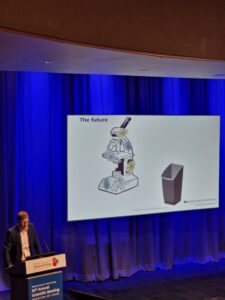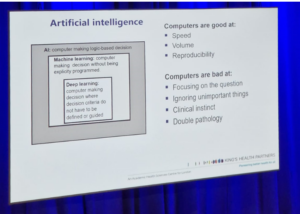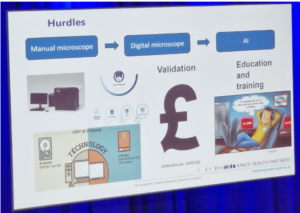What are we most excited about from the BSH 2024 Conference? Here are some of the key takeaways from the event’s discussions that we see reshaping hematology practices:
1. The shift from manual to digital microscopy is inevitable:
Dr. Guy Hannah from King’s College Hospital presented “The Microscope is Dead. Long Live the Microscope: Digital Pathology in Haematology,” in which he discussed the significant logistical hassles and inefficiencies presented by traditional microscopy — such as the need to transport physical slides or have specialized staff travel on-site — and the critical delays they cause. We heard this sentiment from many attendees who shared their struggles with similar challenges.

2. The impacts of embracing fully digital workflows:
Dr. Hannah also highlighted that the industry’s evolution toward fully digital workflows extends beyond replacing old tools and overcoming traditional barriers. He predicts it will allow us to achieve greater reliability in scans and interpretations. This greater standardization will be indispensable, particularly for “lumpy” complex samples like bone marrow aspirates.
3. AI’s role in revolutionizing cell morphology:
The digitization of complete workflows, such as cell morphology, represents a paradigm shift in haematology and healthcare as a whole. Integrating AI decision support systems will be an essential feature of this transition. Computers are able to analyze millions of cells rapidly and reliably, in a way no human can, helping professionals interpret patient data much more effectively.

4. Everyone wants remote capabilities:
A topic that dominated discussions with attendees focused on new web-based technologies that pave the way for 100% remote review and collaboration. The flexibility of remote work will not only bolster workflow efficiency and alleviate staffing challenges but also ensure that high-quality patient care continues unimpeded by geographical limitations.

Disclaimer: Remote capabilities available through the secure hospital network
5. Budget and efficiency challenges are ongoing:
Another hot topic was the critical need for haematology labs to adapt and adopt new technologies that reduce operational costs and enhance diagnostic capabilities. Embracing advancements in efficiency will equip labs to meet modern challenges and optimize resources and improve patient outcomes.
Clearly, efficiency and digitization are top priorities for haematology labs that want to manage their staffing and budget pressures while enhancing their ability to optimize patient outcomes. We’re proud to be paving the way for this revolution with our innovations in imaging and AI.

Connect with us now to learn about solutions available today that address these challenges.


